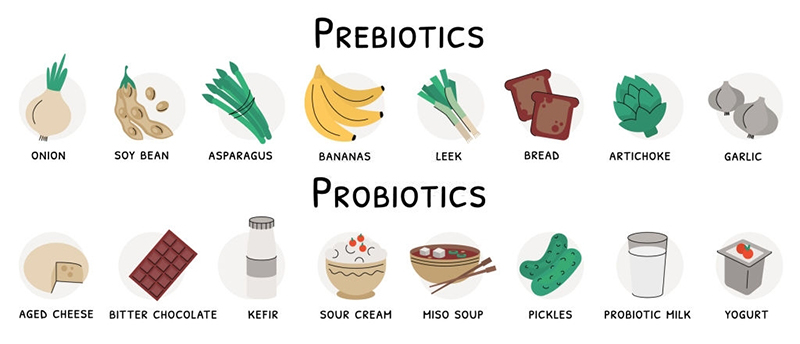Both prebiotics and probiotics aid in the development and maintenance of a healthy colony of bacteria and other microorganisms in the gut, which supports digestion.
By supplying food and creating an environment in which good bacteria can thrive, these food components aid in the promotion of beneficial bacteria. probioticseverything.com prebiotic and probiotic
Fiber-rich foods, such as fruits, vegetables, and whole grains, contain prebiotics. Many fermented foods, such as yogurt, sauerkraut, and tempeh, contain probiotics. probioticseverything.com prebiotic and probiotic
Probiotics’ advantages and disadvantages
Probiotics’ effects have yet to be proven, however evidence suggests that they may be beneficial in the following areas:
– Healthy digestion
Probiotics have been shown in a number of studies to help some people’s digestive health.
Probiotics lowered the incidence of antibiotic-related diarrhea by 60%, according to a Cochrane analysis published in 2017.
Probiotics may help prevent the life-threatening condition necrotizing enterocolitis in premature newborns, according to a 2014 study of 24 trials. probioticseverything.com prebiotic and probiotic
– Mental well-being
Probiotics may boost mental health, according to a tiny body of evidence.
Probiotics may help with depression symptoms, according to a 2017 study, although the authors caution that further research is needed to prove this. probioticseverything.com prebiotic and probiotic
Because there is a relationship between gut and brain health, probiotics may have this effect.
– Health of the gastrointestinal tract
Probiotics may help persons with stomach and bowel diseases, according to the findings of studies. probioticseverything.com prebiotic and probiotic
Probiotics, for example, appear to relieve the symptoms of irritable bowel syndrome (IBS), according to a systematic analysis of trials in persons with the condition. The scientists do caution, however, that it is uncertain how large the benefit is or which probiotic strain is most beneficial.
– General well-being
The data supporting the possible advantages of probiotics was examined by the authors of a 2017 analysis of 17 Cochrane reviews. probioticseverything.com prebiotic and probiotic
They discovered that probiotics may reduce:
the requirement for antibiotics
Absences from school due to colds
the incidence of ventilator-assisted pneumonia
gestational diabetes
vaginal infections, such as yeast infections
Eczema
However, the authors conclude that more trials are needed because they did not uncover high-quality evidence that probiotics can prevent disease. probioticseverything.com prebiotic and probiotic
Negative effects
People with Crohn’s disease had a greater risk of adverse outcomes when using a specific probiotic, according to the same analysis. probioticseverything.com prebiotic and probiotic
Side effects were also more common in people with compromised immune systems.
Probiotics may not be safe for those with major underlying medical issues, according to other studies from the National Center for Complementary and Integrative Health.
Even when they claim to indicate that probiotics work, many studies do not provide safety data, including information on adverse events, according to a 2018 examination of probiotic trials.
Scientists know little about the hazards of probiotics, notably the potential concerns of long-term usage, due to a paucity of evidence on safety. probioticseverything.com
Before considerably increasing their probiotic intake, anyone concerned about the danger of negative effects should consult a doctor.
Prebiotics’ advantages and disadvantages
Some foods include prebiotics, which the body cannot process. In the gut, they provide food for bacteria and other helpful creatures.
The advantages of prebiotics are related to the advantages of probiotics. Prebiotics may help maintain a healthy gut by improving digestive health, reducing antibiotic-related health concerns, and providing other advantages.
Prebiotics have received less research than probiotics.
As a result, it’s uncertain how much prebiotics help with health. Scientists aren’t sure if they can make probiotics’ touted advantages even stronger.
According to some research, prebiotics may help the body by:
– calcium absorption improvement
– altering the body’s ability to digest carbs
– promoting the proliferation of probiotic microorganisms in the gut, potentially improving digestion and metabolism
People do not need to take prebiotic supplements because prebiotics are found naturally in many foods.
There is no evidence that combining prebiotics and probiotics is detrimental at this time. However, unless a doctor advises differently, persons with chronic disorders or serious illnesses should avoid using probiotic or prebiotic supplements.
Prebiotic side effects research is also in its early stages and requires more inquiry.

